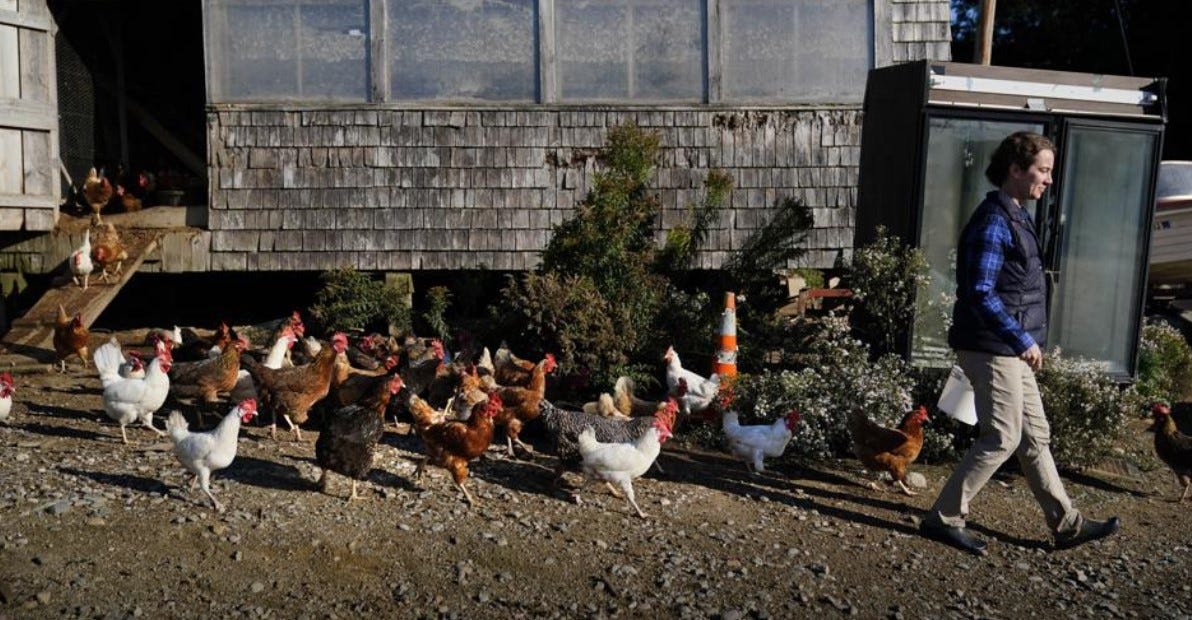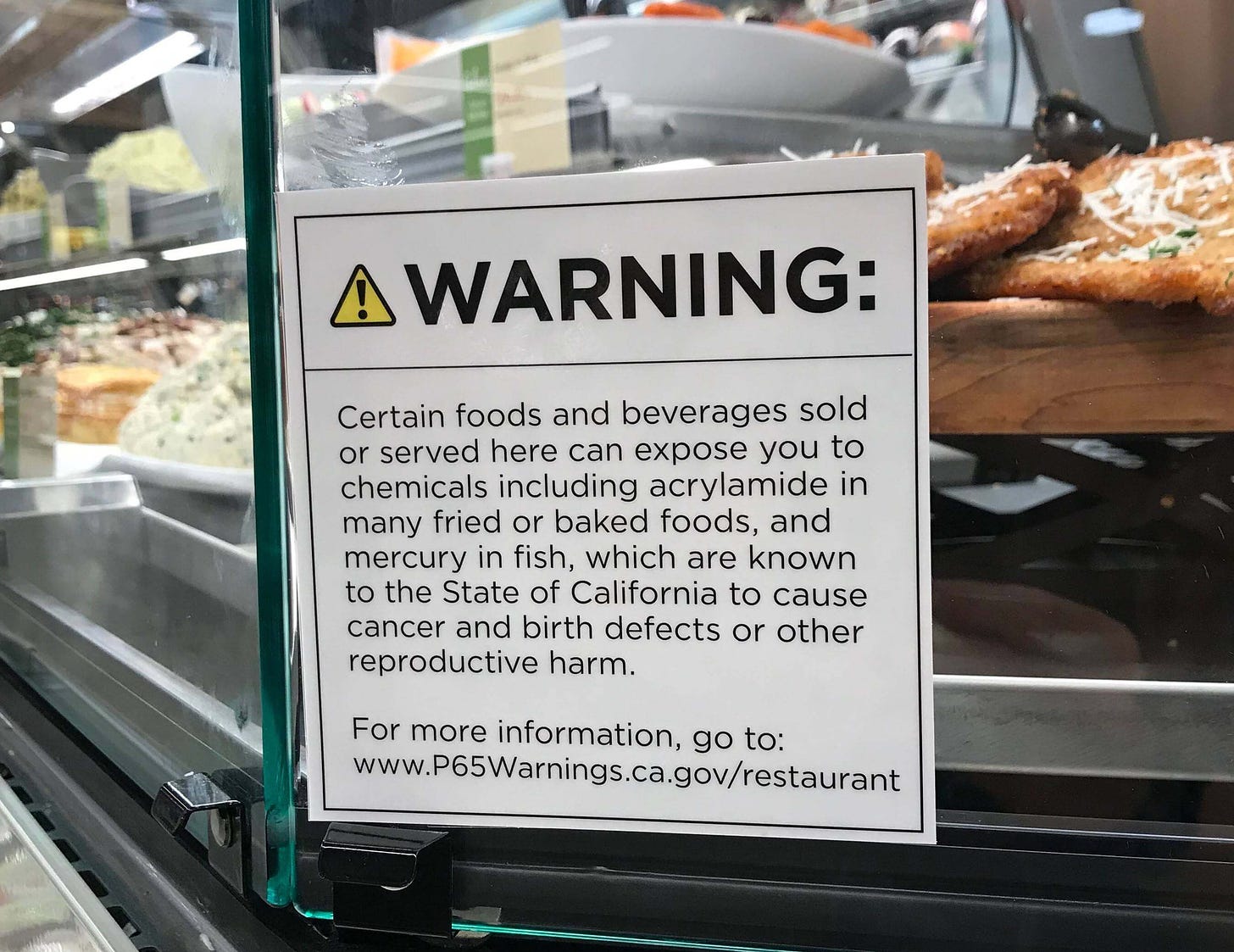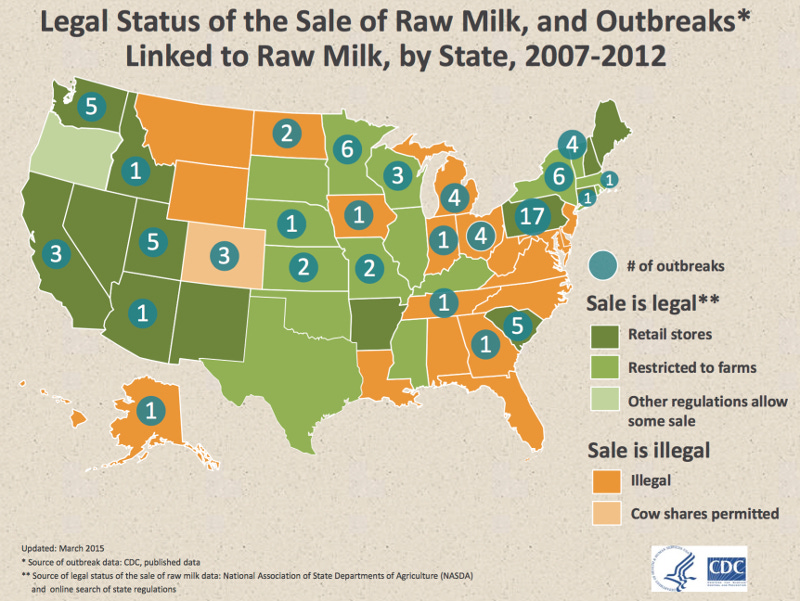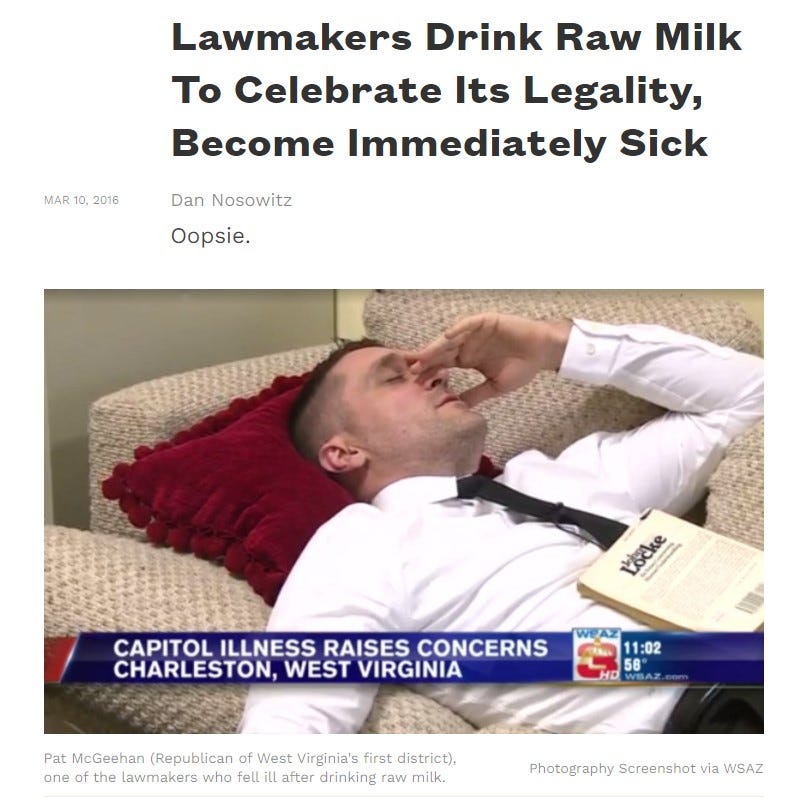Ricochet is the best place on the internet to discuss the issues of the day, either through commenting on posts or writing your own for our active and dynamic community in a fully moderated environment. In addition, the Ricochet Audio Network offers over 50 original podcasts with new episodes released every day.
 A Constitutional Right to … Food?
A Constitutional Right to … Food?
One of the more interesting ballot questions last Tuesday was Question 3 in Maine. The 43-word constitutional amendment, overwhelmingly approved by voters, reads as follows:
“All individuals have a natural, inherent and unalienable right to food, including the right to save and exchange seeds and the right to grow, raise, harvest, produce and consume food of their own choosing for their own nourishment, sustenance, bodily health and well-being, as long as an individual does not commit trespassing, theft, poaching or other abuses of private property rights, public lants, or natural resources in the harvesting, production or acquisition of food.”
It’s a little hard to figure out precisely what this means.
The coalitions supporting and opposing the initiative were bipartisan and unusual. Democratic legislators joined Republicans in support. Animal rights organizations joined the Maine Farm Bureau and Maine Potato Growers Council in opposition.
But no one seemed to care enough to invest much money in the campaign. A total of less than $8,000 was spent by both sides to influence the outcome.

Ballotpedia’s quote of Republican St. Rep. Billy Bob Falkingham, the author of the amendment, best explains its scope and purpose:
“Jumping ahead 25 or 50 years into the future, could we see our government creating roadblocks and restrictions to the people’s right to food? Will the government be telling people what they are allowed to eat and where they can grow it? Will Monsanto own all the seeds, and will we have gotten so far from our roots that we won’t even have natural seeds anymore? Will people even be allowed to grow gardens? Or will gardening become a luxury reserved for the rich? … Will we need it, 25, 33, or 50 years from now? If we wait until then to find out, it will be too late.”
Does that include federal patent and trademark laws since seed companies spend millions to engineer their seeds through hybridization or genetic manipulation to help farms produce more crops?
Faulkingham, a lobster fisherman by trade, is somehow worried that the government and corporations will prevent people from growing gardens, saving, and exchanging seeds. “There’s a lot of disturbing trends in the food category, with the power and control that corporations are taking over our food,” Faulkingham told Associated Press. That’s about as specific as the “right to food” gets. Good luck, judges and justices. I know of no food company plan to rid the nation of community or personal gardens.
Animal rights activists were opposed, fearful that Question 3 would open doors to animal cruelty.
Oh, sure, there is a long history of the “right to hunt and fish” and provisions in various state laws. Twenty-three states have such laws. A 24th, California (of course) grants a right to fish but not to hunt. Vermont was the first to constitutionalize it in 1777. Other states have or have contemplated “right to farm” provisions. But this is different, and courts will have to decide what it means and how far it goes.
And for food regulators and food makers, what other states will follow suit? And speaking of suits, how will the first lawsuits by farmers or others, using the law, look like, and against whom? I’m sure some enterprising food trial lawyers already have their thinking caps on, involving a sympathetic farmer and a food retailer with big pockets and lots of pricing power in the market, such as Walmart. So do others.
And that’s ultimately what this may be about. Follow the money.
While Maine has a long history of quirkiness on food issues, California is right there with them, from “anti-confinement” laws for pigs and chickens to requiring warning labels on foods that contain chemicals known to cause cancer or congenital disabilities, like alcohol. Proposition 65 warning labels are so ubiquitous in California that most people ignore them.

All this has emerged under various rubrics, such as “food sovereignty” or simply “the food movement.” Like all movements and revolutions, it has its patron saints and celebrities. It is motivated by farm-to-consumer relationships and access to “pure,” “fresh,” or “natural” food untainted by corporate middlemen, bigness, technology, and things like preservatives, flavorings, artificial fertilizers, colors, and other attributes found in many packaged foods. It reflects an emotional and romantic, if not religious, desire to connect more closely to food. They believe they taste better and are healthier for you, a matter of long-standing debate. These are the folks behind the explosion of farmers’ markets in urban/suburban settings over the past several years.
Food involves all our senses and connects us to special events in our lives. What significant life moments, at least the celebratory ones, don’t include food? Food issues are also sadly and tragically used as a weapon to scare people and raise money.
Convenience and price are often overlooked or ignored. And tragically, so is food safety.
There is no better example of that than the long-standing debate over raw milk consumption. While the US Food and Drug Administration outlaws the interstate sales of raw milk and the Centers for Disease Control warn against human consumption, it is legal in most states. Just 13 states outright prohibit retail or farm sales, although a couple allows you to access raw milk through “cow sharing” arrangements with farmers and fellow consumers.

And yes, raw milk consumption is dangerous. Let’s consult the Centers for Disease Control via foodsafetynews.com:
Based on statistics from the five-year period 2009-2014, people who drink unpasteurized, raw milk are 840 times more likely to contract a foodborne illness than those who drink pasteurized milk.
The statistics, included in a research report scheduled for publication in the upcoming June issue of “Emerging Infectious Diseases” also show raw milk drinkers are 45 times more likely to be hospitalized if they get sick than people who become ill from drinking pasteurized milk.
“Unpasteurized milk, consumed by only 3.2 percent of the (U.S.) population, and cheese, consumed by only 1.6 percent of the population, caused 96 percent of illnesses caused by contaminated dairy products,” according to the report scheduled for June publication by the Centers for Disease Control and Prevention.
And the raw milk industry might be the biggest winner in the “right to food” campaign.
Just in case you’re in doubt about the danger of raw milk, let’s consult members of the West Virginia legislature just after they celebrated the legalization of retail raw milk sales in 2016 in the state by drinking it. Maybe they should have stuck with champaign.

I get the philosophical argument, and I’m entirely aware of the emotion it engenders. I’ve been on the receiving end. It’s the same with motorcycle riders about wearing helmets, and many others: “my body, my choice.” Except your decision to consume raw milk might send you to a hospital, and if you don’t have insurance, and even if you do, the rest of us will be paying the bill through higher insurance rates or tax dollars through Medicare or Medicaid. Medical professionals, who are kind of busy right now, will be diverted. Sometimes, we have a responsibility to own the full consequences of our optional decisions. Please don’t make the rest of us pay for your stupidity.
Do you want to embrace libertarianism? Then go The Full Monty: your body, your choice, your expense.
This is one issue where Republicans can be just as stupid as Democrats. And if you think feeding raw milk to your children will help them, think again. You might as just as well introduce them to Russian Roulette. If you’re not familiar with that, this clip from the Academy Award-winning “Deer Hunter” from 1978 will show you how it works. I wouldn’t show this to young children. Or serve them raw milk.
While the CDC and FDA may have – well, did – screw up the messaging of COVID vaccines, they at least got this issue right.
No one person has done more for food safety than the legendary Dr. Louis Pasteur, who discovered that treating foods with heat for short periods destroyed bacteria and other pathogens that made people sick.
Take the canned food in your store. There is nothing safer, and few things more affordable. Corn, spinach, peas, and more are picked at the peak of freshness and, usually within four hours, are sorted, washed, fed into a can, sealed, and placed into a “retort” or spiral cooker that heats the products in the sealed can for a specified period. The process of canning preserves foods without chemicals. Cooking the product in the can kills harmful bacteria without destroying other beneficial characteristics. Yes, vitamin C, which is heat-sensitive, is lost in the “pasteurization” process. But most other things like fiber and other vitamins remain. And canning keeps it safe for a couple of years before the quality slowly starts to be lost. Frozen food has similar advantages over a shorter period. No such luck with fresh products, which have their place as well.
But canned foods are not “fashionable” for reasons that escape me. Canned foods are affordable and perhaps the most valuable entities of our food supply. Steel and aluminum cans are recyclable. Condensed soup, invented more than a century ago, was America’s first truly “sustainable” food. But they don’t appear “fresh” or “local” to “foodies.” The food world has lots of work to do on educating Americans on the safety and efficacy of our food supply. It is truly miraculous, even with today’s government-induced supply chain challenges.
Maine’s “Right to Food” amendment may start a trend, supported by raw milk apostles and others with unsubstantiated and false notions of food that move to other states. It’s a vague if not terrible law with potentially severe consequences. Don’t let it take root in your state, and let’s hope judges strike this down as vague and wholly unenforceable law and make it go away.
Published in General



My wife is into gardening and used to run the local seed swap at the library. There is a bunch of legal restrictions on what seeds are allowed to be swapped. Many of which the library being a government entity felt it had to enforce. It got to be so much of a hassle that she finally gave it up between the seed swap restrictions and the COVID restrictions at the library.
It really is amazing how many rules and law there are in what seeds can be used in what areas.
Very interesting, and yes weird that they felt it was a big enough concern to be on the ballot. Maine is one of those states that those who ‘want to get back to the earth’ has a reputation for. They’ve always been independent and lived off the land, more than other areas. So for there to be a concern, they must know something. A good story to follow and dig into……
I suspect that something to do with patented seeds.
more than that. Back around 2014 laws were put in that made many heirloom seeds illegal to sell or trade. Some of this is state level or state level forced by federal law. Some of this is federal level. The laws are getting so you have to buy seeds provided by the seed companies and not traditional seeds the local guys buy or swap from each other.
I suspect there’s crony capitalism somewhere in between the lines of this story. In fact, I’ll bet Monsanto is the company the writers of that bill are directing their wrath at.
To Monsanto, it’s about intellectual property and patent rights and copyrights for their hybridization research and development. Home gardens are to Monsanto what Xerox machines were to book publishers and MP3 programs were to music publishers.
In Monsanto’s defense, their business is creating hybrids of plants that are genetically altered to result in plants that resist disease, mildew and mold, and insects. There is of course a price to be paid for these characteristics–loss of flavor for vegetables and loss of color and scent in flowers. The biggest problem for Monsanto is that most hybrids are unstable. Plants revert to their unaltered version pretty easily. I find that greatly reassuring. It means I’m not as afraid of GMO crops as some people are. Monsanto thinks the only way they can protect the investment their own customers make in buying Monsanto’s GMO seeds is keeping other hybrids or the original plant away from their own customers’ fields.
The GMO work and development was a byproduct of the anti-pesticide–particularly systemics but also those applied to the outside of the plants–and anti-fungicide and anti-phosphate movement.
Monsanto is in a risky business. The company is trying to control consumers as a way to minimize that risk. It would be better if the company used the Google and Microsoft business models that give a lot of stuff away and accept the petty pilfering. I don’t know of any company that has ticked off their customers as much and as consistently as Monsanto. To small farmers and home gardeners, “Monsanto” is a curse word.
The big underlying problem is that people are simply afraid of Monsanto for many reasons. They are afraid that Monsanto will hurt them legally and financially, and they are afraid that these new hybrids will take over the world and we won’t be able to grow our beloved heirloom tomatoes at some point in the near future.
As is the case in all such widespread conflicts, there are compelling arguments and honest fear on both sides of these issues.
Burpee is involved in the seed business too, by the way. But Burpee is loved everywhere in the gardening world. Most of the gorgeous vegetables we see in the garden centers and high-end vegetable stores are Burpee hybrid plants.
Monsanto has made some terrible business decisions, and I think there is something wrong in the psyche of the company’s leadership team. There’s a war brewing with Monsanto on one side and the home gardeners and small-farm growers on the other. It’s a serious situation.
Neither is irradiated food, no thanks to the anti-nuke crowd. Little do they realize irradiated food could “save the planet” by allowing refrigerated foods like meat to be stored at room temperature for weeks if not months.
I’ll have fries with that.
I was hoping someone would mention irradiated food.
It’s interesting that in Western Europe, GMO food is a no-no but irradiated food is accepted without question.
My father told me that growing up his father would call around to to see who had the lowest bacteria count in their milk and would buy that. How they survived before pasteurization is beyond modern understanding I suppose.
I’ve never understood this argument. It is: If you hurt yourself, I feel a personal obligation to help you, and this is so odious to me that I will forever force your to alter your lifestyle to keep me from having to help you. You see, my morals force me to control your life.
What’s the biggest deal with Monsanto is that their patent enforcement forbids farmers to keep some of their seeds to plant next season, keeping the farmer forever a indebted to them. And moreover, they say that for any partial natural wind-borne hybridization from one farmer who uses their seeds to another farm that doesn’t use product, that second farmer is a violation of their patent and can’t replant their seeds either.
I think we could look to the EU to see examples of government monopolizing what foods can be grown. Bananas have to be a certain length. There are rules about the shapes and sizes of other fruit.
Never underestimate the power of bureaucracy to make our lives miserable.
From:
COMMISSION IMPLEMENTING REGULATION (EU) No 543/2011
II. PROVISIONS CONCERNING SIZING
Size is determined by the maximum diameter of the equatorial section of the fruit or by
count.
A. Minimum size
The following minimum sizes apply:
Fruit Diameter (mm)
Lemons 45
Satsumas, other mandarin varieties and hybrids 45
Clementines 35
Oranges 53
B. Uniformity
Citrus fruit may be sized by one of the following options:
(a) To ensure uniformity in size, the range in size between produce in the same
package shall not exceed:
– 10 mm, if the diameter of the smallest fruit (as indicated on the package) is < 60
mm
– 15 mm, if the diameter of the smallest fruit (as indicated on the package) is ≥ 60
mm but < 80 mm
– 20 mm, if the diameter of the smallest fruit (as indicated on the package) is ≥ 80
mm but < 110 mm
– there is no limitation of difference in diameter for fruit ≥ 110 mm.
p { margin-bottom: 0.1in; line-height: 115%; background: transparent }
30 years ago, under the Common Market rules of the time, it was illegal to plant English oaks in England.
Yes – and the traditional seeds can be saved after the fruit or vegetable is used, to replant later. Many of the newer seeds, especially the seeds sold to farmers, are not able to re-seed. They are sterile. So the farmers are forced to buy new each year and many of the seeds are also Round-up Ready, containing the pesticide. Now Round up is being banned and the landscapers are having to go to other chemicals. Monsanto is always in the middle of it.
My sister buys organic seeds when she can find them, and she’ll get a crop of cabbage or kale from last year’s seeds when they just fell on the ground in Fall, survived the Maryland winter in the ground and re-sprouted. My nephew also got pumpkins that way.
The rights to property should come with the rights to grow and harvest food product on your property. I should think that would go without saying.
The origins of such a campaign (of which I give conditional support) is the crackdown by city ordinances against poultry farming and edible gardens and GMO seeds that, if accidentally found on your property, can cost you your entire farm. You’d think an edible garden would be in controversial, but apparently, cities ban it.
I can see bipartisan opposition to it, as well, as the food industry has been a powerful lobby for a very long time.
Deprive people of the ability to feed themselves off their own property makes them easier to control. You can’t buy groceries without a vaccination? How many people would choose starvation over vaccination?
Currently, with the current bell weathers, homegrown food is on a rise, because if we can feed, shelter, protect, and clothe our families, we are far less dependent on government.
————
Its an interesting conversation – much more balanced than the OP was. And no one really took the author to task for his one-sided approach to the issue.
Uh, no. Round-up ready means the plant has been genetically engineered to not die when exposed to round-up. So the gardener can spray his weeds with abandon without killing his intended crop. Round-up ready plants do not contain Round-up.
And milk. I used to buy irradiated milk in the UK. No refrigeration needed.
And the tastiest bananas I’ve ever had were tiny, the length of your finger. What we get as bananas is only one variety.
I can remember going to the market to buy oranges for the first time in Brazil. I couldn’t find the oranges. They were green and looked like limes and as small as limes. They were also super delicious.
I agree that the OP is one-sided. For instance, safety is more a problem than ever because of industrialized animal production. Think antibiotics and hormones, to say nothing of e-coli. In addition people are right to worry about property rights and family farms, both of which are under attack. The control of seeds was one part of Stalin’s Ukraine famine. He not only took the harvest but also the seeds for the following year. Meanwhile Bill Gates is buying up farmland. This is about reasserting control and I would have voted for it if I lived in Maine. I don’t think we need to worry about Monsanto.
Or the danger of importing some invasive species…?
Isn’t this the exact same logic used to ban large sodas? What is the limiting principle? As a society, do we have the right to control any action someone takes that may unintentionally result in the need for medical care?
I don’t get this picture in the OP. A business man home for the evening, trying to relax, and has a headache?
My wife’s mother used to buy raw milk and just boil it. There’s a lot more to this amendment than just raw milk. At first glance I think it’ a way to stop governments from outlawing victory gardens.
I am however in favor of outlawing sugar and salt. They are relics of white privilege.
I think spices in this country are irradiated, but I don’t remember where or when I got that info, or if it’s even true . . .
US mail is irradiated.
No wonder it tastes bland . . .
I am confused why an amendment saying I can have a garden in my yard is controversial.
It goes against the agenda.